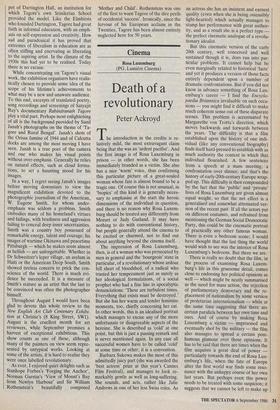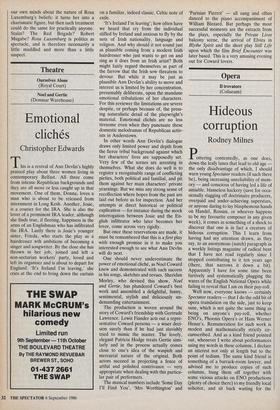Cinema
Rosa Luxemburg (PG, Lumiere Cinema)
Death of a revolutionary
Peter Ackroyd
The introduction in the credits is re- latively mild, the most extravagant claim being that she was an 'ardent pacifist'. And the first image is of Rosa Luxemburg in prison — in other words, she has been immediately branded as a victim. She also has a nice 'warm' voice, thus confirming this particular picture of a great-souled woman whose fate is almost bound to be a tragic one. Of course this is not unusual; in `biopics' of this kind it is generally neces- sary to emphasise at the start the heroic dimensions of the individual in question, and there is no reason why Rosa Luxem- burg should be treated any differently from Mozart or Judy Garland. It may have nothing to do with conventional history, but people generally attend the cinema to be excited or charmed, not to find out about anything beyond the cinema itself. The impression of Rosa Luxemburg, then, is of a woman who was persecuted by men in general and the 'bourgeois' state in particular, of a revolutionary whose ardour fell short of bloodshed, of a radical who trusted her temperament just as surely as her ideological formulations, of a social prophet who had a fine line in apocalyptic denunciations: 'These are turbulent times. Everything that exists must be destroyed.' But she has her warm and tender feminine moments, too, chiefly concerning her cat. In other words, this is an idealised portrait which manages to excise any of the more unfortunate or disagreeable aspects of the heroine. She is described as 'cold' at one point, but this is just a passing remark and is never mentioned again. In any case all successful women have to be called 'cold' at some time or other; it is a convention.
Barbara Sukowa makes the most of this admittedly juicy part (she was awarded the `best actress' prize at this year's Cannes Film Festival), and manages to look re- markably gentle as well as long-suffering. She sounds, and acts, rather like Julie Andrews in one of her less Swiss roles. As an actress she has an insistent and earnest quality (even when she is being ostensibly light-hearted) which actually manages to stamp her performance with great author- ity, and as a result she is a perfect type the perfect cinematic analogue of a revolu- tionary idealist.
But this cinematic version of the early 20th century, well conceived and well sustained though it is, does run into par- ticular problems. It cannot help but be even marginally related to historical 'facts' and yet it produces a version of those facts entirely dependent upon a number of dramatic confrontations. But if you did not know in advance something of Rosa Lux- emburg's career — I find the Encyclo- paedia Britannica invaluable on such occa- sions — you might find it difficult to make much coherent sense out of these disparate scenes. This problem is accentuated by Margarethe von Trotta's direction, which moves backwards and forwards between the years. The difficulty is that a film established upon the history of one indi- vidual (like any conventional biography) finds itself hard-pressed to establish with as much authority the context in which that individual flourished. A few sentences from a speech at a mass meeting; a confrontation over dinner; and that's the history of early-20th-century Europe wrap- ped up. This difficulty is then compounded by the fact that the 'public' and 'private' lives of Rosa Luxemburg are given almost equal weight, so that the net effect is a generalised and somewhat attenuated ver- sion of the recent past. If all the actors put on different costumes, and refrained from mentioning the German Social Democratic Party, this could be the cinematic portrait of practically any other famous woman. There is even a bedroom scene; I would have thought that the last thing the world would wish to see was the interior of Rosa Luxemburg's bedroom. But there we are.
There is really no doubt that the film, in the process of examining Rosa Luxem- burg's life in this gruesome detail, comes close to endorsing her political opinions as well — which might be neatly summarised as the need for mass action, the rejection of parliamentary democracy and the re- placement of nationalism by some version of proletarian internationalism — while at the same time suggesting that there are certain parallels between her own time and ours. And of course by making Rosa Luxemburg a victim — imprisoned and eventually shot by the military — the film also manages to spread a certain post- humous glamour over those opinions. It has to be said that there are times when the film acquires a great deal of power particularly towards the end of Rosa Lux- emburg's life, when the fate of Europe after the first world war finds some reso- nance with the unhappy course of her own last years. But perhaps even this power needs to be treated with some suspicion; it suggests that we cannot be left to make up our own minds about the nature of Rosa Luxemburg's beliefs: it turns her into a charismatic figure, but then such treatment could do the same for practically anyone. Stalin? The Red Brigade? Robert Mugabe? Rosa Luxemburg is politics as spectacle, and is therefore necessarily a little muddled and more than a little suspect.







































 Previous page
Previous page